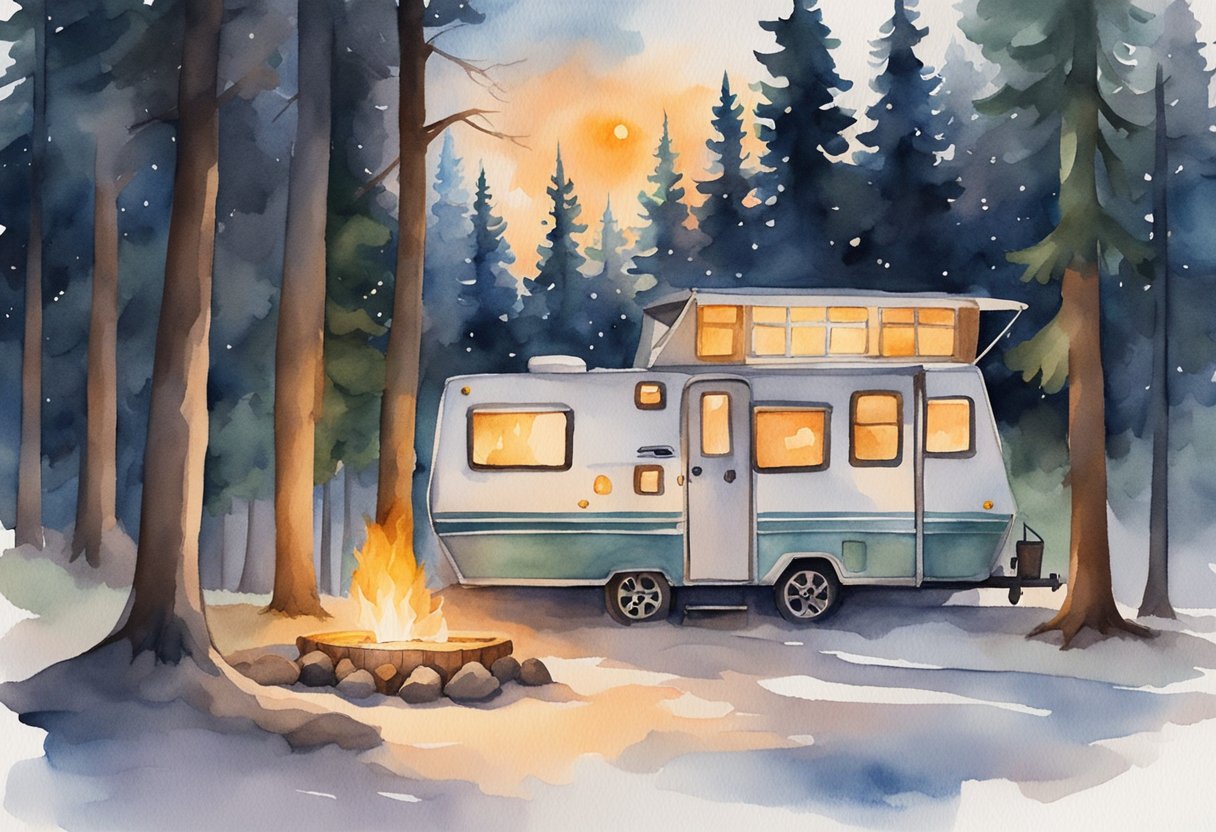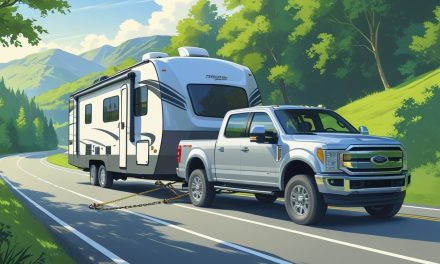Planning an RV trip can be exciting, but finding the perfect campsite can feel overwhelming. Many options exist, from luxurious RV resorts to serene, rustic campgrounds. Understanding where to look and what to consider can make a huge difference.
Choosing the right RV campsite ensures comfort, convenience, and memorable experiences. This article shares seven practical ways to find the best spots for parking your RV, helping you make the most of every journey.
1) Check Online Reviews
Would you like to save this article?
Reading online reviews is a great way to find the best RV campsites. Many websites and apps let travelers share their experiences and rate different sites. This real feedback can help you understand what to expect.
Look for reviews on popular apps like Sekr and The Dyrt. These apps allow users to rate campsites and leave comments about their stays. By reading these reviews, you can learn about the cleanliness, safety, and amenities of each site.
Pay attention to recent reviews for the most up-to-date information. This helps you avoid outdated or no longer accurate details about the campsites. Also, look for patterns in the comments. If multiple people mention the same pro or con, it’s likely a consistent feature of that campsite.
Photos shared by other travelers can provide a visual sense of the site. These images can show you what the campground looks like, from the layout to the surrounding scenery.
Online reviews can also highlight nearby activities and attractions. This can help you find a campsite that offers not just a place to park, but also fun things to do during your stay.
2) Book in Advance
Booking your RV campsite in advance can make your trip much smoother. Many popular campsites get reserved quickly, especially during peak seasons. By planning ahead, you can choose the best spots and avoid the disappointment of finding your desired site fully booked.
He or she should start by researching the campsite’s reservation system. Some parks allow bookings months in advance, which is perfect for long-term planners. Others might offer reservations just a few weeks prior. Knowing these details helps in setting reminders for booking dates.
Using online reservation platforms can also be a big help. Websites like ReserveAmerica and CampNab provide useful tools for checking available sites and setting up alerts. These tools can notify campers of last-minute openings due to cancellations, giving an extra chance to grab a spot.
Another good tip is to book during non-peak times if possible. Weekdays and off-season months often have more availability, which sometimes means less crowded parks and better campsite choices. Booking in advance during these times can be particularly rewarding.
Finally, aim to be flexible with your itinerary. Sometimes the best spots might require slight changes to your plans. Booking early gives the chance to secure the best possible experience at your favorite campsites.
3) Join an RV Club
Joining an RV club can make finding the best campsites much easier. Many clubs, like the Good Sam Club, offer discounts at a wide range of campgrounds. Members can save money on overnight stays and access special deals on fuel and camping supplies.
Thousand Trails is another popular choice. They provide “zone passes” that give members access to campgrounds in specific regions. This can be a great option for those who travel to different areas throughout the year.
Escapees RV Club includes access to two clubs: Escapees and XCapers. These clubs offer different benefits, such as exclusive campgrounds and events. It’s especially useful for families or people who work from the road.
Passport America offers significant discounts, sometimes up to 50% off the standard rate. This can add up to big savings over time, especially for frequent travelers.
RV clubs often host events like rallies and tours. These activities provide a great way to meet other RV enthusiasts. Sharing adventures and tips with a community can enhance the whole RV experience.
In addition to discounts, many RV clubs offer other benefits. These might include emergency road assistance, trip planning tools, and access to various resources.
4) Use Specialized Apps
Specialized apps can help find the best RV campsites. They offer features that make planning easier, such as reviews, amenities, and booking options.
Campendium is a great choice for RV enthusiasts. It allows users to share reviews and tips about campgrounds. The basic app is free, but some features require in-app purchases.
All Stay Apps is another option. It covers a wide range of camping spots, including unique locations like Walmart parking lots and military bases. This app is available on iOS for $9.99.
The KOA camping app is also helpful for finding and booking campsites. You can search by name, location, or map. It even lets you track Value Kard rewards.
Sekr, known as the vanlife app, is popular among RV travelers. It finds campsites and provides info on local events, wifi, and even laundry. Users can rate and review stops to help others.
For those looking to camp on federal lands, Recreation.gov is a valuable resource. It’s one of the best platforms for finding and booking RV campsites.
5) Ask Fellow RVers
One of the best ways to find great RV campsites is by talking to other RVers. They have firsthand experience and can offer insights that you won’t find in online reviews.
Joining RVing clubs or online RV forums allows you to connect with a community of travelers. These platforms are perfect for sharing tips and recommendations.
Campgrounds and RV parks often have common areas where you can meet other RV enthusiasts. Don’t be shy about striking up a conversation and asking them where they’ve stayed.
Word-of-mouth recommendations can lead you to hidden gems that aren’t widely advertised. Fellow RVers can tell you about the amenities, atmosphere, and any special features of a campsite.
Asking other RVers can also help you avoid places that haven’t met their expectations. They can provide honest feedback about sites that might look good online but have issues.
Never underestimate the value of advice from someone who’s been there before. Their experiences can make your trip more enjoyable and stress-free.
Encouraging friendly chats with fellow travelers can be as rewarding as finding a great campsite. It’s all part of the RV lifestyle!
6) Read Travel Blogs
Travel blogs are a great way to find the best RV campsites. Many bloggers share their personal experiences and tips on where to park your RV.
Some popular bloggers like Kyle and Olivia Brady from Drivin’ And Vibin’ offer daily articles with useful RVing tips. They also have videos with campsite tours and advice on boondocking.
Travel bloggers often explore unique and hidden gems that might not be listed on regular camping directories. This can lead to discovering amazing campsites off the beaten path.
Blogs also have updated information. Bloggers share the latest news on campsite conditions, rules, and fees, which is very helpful for trip planning.
If you follow a few RV bloggers, you can also read about their different adventures and get inspired for your own journeys. Frequent updates and personal stories make the content engaging and informative.
7) Visit Social Media Groups
One of the easiest ways to find the best RV campsites is by joining social media groups. Facebook groups and RV forums are popular for this. They offer a space where RV enthusiasts can share their experiences and recommendations.
Members of these groups often post reviews and photos of campsites they’ve visited. This first-hand information can help you decide where to stay. You can ask questions and get quick responses from other RVers.
There are many groups dedicated to RV life, and some even focus on specific regions. Joining several of these groups can give you a variety of perspectives on different campsites. Social media also allows for direct communication with locals who have in-depth knowledge of the area.
These groups can also be great for connecting with other RVers. You might even make some new friends on the road. Sharing tips and experiences with fellow group members adds to the enjoyment of your travels.
Also, consider joining groups on other social media platforms like Instagram and Twitter. Hashtags and posts related to RV camping can lead you to new campsite discoveries. Social media groups are a valuable resource for any RVer looking to find the best campsites.
Understanding RV Campsites
When choosing an RV campsite, it’s important to know the different types available and the key features that can make your stay more enjoyable.
Types of RV Campsites
RV campsites come in various types, each providing different amenities and experiences. Private RV parks are often well-maintained and offer full hookups, including electricity, water, and sewer connections. They might also include amenities like Wi-Fi, pools, and laundry facilities.
State and national parks offer a more natural setting but might have limited hookup options. These parks are great for those looking to explore nature. Boondocking sites are usually free and found on public lands. They offer no hookups but are ideal for those who prefer solitude and adventure.
Campgrounds with pull-through sites are convenient for larger RVs as they allow easy entry and exit without the need for backing up. Back-in sites can be more challenging to navigate but often provide more privacy and space.
Key Features to Look For
When selecting an RV campsite, there are several key features to consider. Look for campgrounds with full hookups if you need consistent power, water, and sewer services. Sites with level ground make it easier to park and set up your RV without needing extra leveling blocks.
Wi-Fi availability can be important for those who need to stay connected. Check if the campground offers reliable internet service. Restroom and shower facilities can add extra comfort, especially if your RV has limited amenities.
Consider the proximity to attractions. Campgrounds near trails, lakes, or other attractions can make your trip more enjoyable. Also, check for pet-friendly policies if you are traveling with pets. Lastly, look at the reviews and ratings of the campsites to get an idea of other campers’ experiences.
Using this information, choosing the right RV campsite can enhance your travel experience, providing both comfort and convenience.
Planning Your RV Camping Trip
Effective planning is the cornerstone of a successful RV camping trip. This involves selecting the best time of year for your journey and securing reservations well in advance to avoid any last-minute surprises.
Choosing the Right Season
Picking the right season can make a huge difference in your RV camping experience. Different regions offer unique benefits depending on the time of year. For example, spring and fall are typically less crowded and boast pleasant weather in many parts of the country.
During the summer, popular destinations can become crowded and campsites fill up quickly. Summer also brings more activities and events, especially in family-friendly RV parks. On the other hand, winter can be an excellent time to visit warmer climates like Florida or Arizona, where the temperatures are milder.
Consider local events and holidays, as these can affect campsite availability and cost. Use weather forecasts and historical climate data to pick the best season for your trip.
Booking in Advance
Booking your campsite ahead of time is crucial. Popular campgrounds, especially in national parks, can book up months in advance. Websites like Recreation.gov and HipCamp can assist with reservations on federal lands and private spots.
Early booking gives you access to the best campsites with the most amenities, such as hookups, Wi-Fi, and scenic spots. Some RV parks allow reservations up to a year ahead, which can be very helpful for planning popular holiday trips.
Stay flexible with your dates to increase your chances of securing a reservation. Consider making use of campground memberships or loyalty programs, which sometimes come with priority booking options and discounts.







